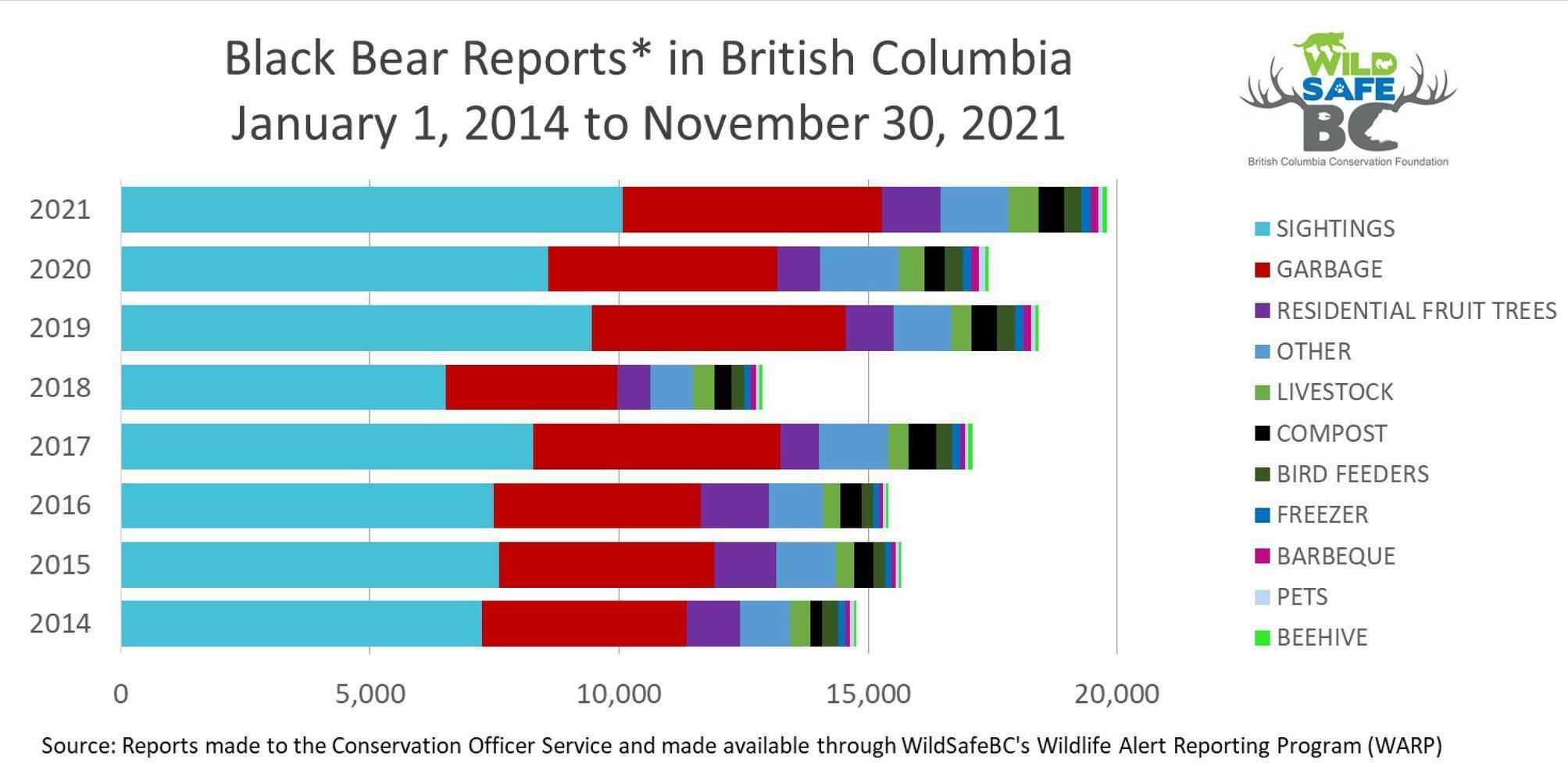Residents of British Columbia have seen more of their furry neighbours then ever before in 2021.
It was a record-breaking year for black bear sightings in B.C., with nearly 20,000 reports of bear sightings in communities around the province.
Black bears, much like the people, were greatly affected by the harsh summer in 2021. Wildfires, billowing smoke, and higher-than-normal heat changed many of the bear’s normal habits by affecting their natural food sources, and in some cases, destroying their habitats.
In nature, bears have competition for food. In years like this one where natural food sources such as berries may be more scarce, bears venture from their habitats in search of nourishment.
All reports of black bear sightings are made by the public to conservation officers, and are recorded and shown on the Wildlife Alert Reporting Program (WARP) map.
According to Vanessa Isnardy, of WildSafeBC, black bears’ famous sense of smell lead them into communities in search of food, following the smells of crops and fruit grown on trees, unsecured garbage and even bird feeders.
Isnardy said, this year the province saw a rise in the number of bears seeking food sources all over B.C., from the west coast all the way to the interior. She said that bears, like most animals, have a natural weariness of human activity, but when their food sources are affected, they venture into areas they prefer not to be.
The number of bear sightings reported to conservation officers in July of 2021 was uncharacteristically low, leading WildSafeBC to believe that a lot of the natural food crops ripened early in the season due to the high temperatures leading to more bears venturing into communities later in the season.
READ MORE: Bear necessities: How Revelstoke can prepare for an increased number of bear sightings
According to Revelstoke Bear Aware, bears in the area are eating in excess of 20,000 calories per day in order to fill up before hibernating January to mid-March. In milder climates, where there’s still access to food, bears could stay active until late January.
According to WildSafeBC, the number of reported bear sightings in communities across the province will pass the 20,000 mark by the end of the year. They encourage anyone who sees a bear in their community to report it to a conservation officer.
“People are often concerned that if they call in a sighting that automatically the conservation officer’s are going to destroy that bear, and that is simply not the case,” said Isnardy. “They treat every situation individually by looking at the circumstances.”
According to Isnardy, relocation has not been proven to be very effective with bears. When they know they can find food in a community, they will return, especially when there’s not a lot of natural food available.
WildSafeBC focuses on educating the public on what they can do to bear-proof their property.
They recommend storing garbage inside garages, building sturdy sheds or investing in storage containers such as the TuffBox and freezing the waste that cause odours such as bones and leftovers.
Isnardy says that fruit trees are a gateway food for bears. Trees, which many consider to be a natural resource, lead bears into the community. When bare, they turn to other sources and are already more comfortable in the community.
If you’re not using the fruit, replace the tree with something that doesn’t produce fruit. If you do use the trees, be sure to secure the trees within fences or wiring.
Visit wildsafebc.com to find out more on how you can bear-proof your property, to view the WARP map, and to learn more about bears.
Free courses are available on their website, including this video on how to stay safe in bear country:
READ MORE: Bold bear breaks into West Kootenay family home
@josh_piercey
josh.piercey@revelstokereview.com
Like us on Facebook and follow us on Twitter.
and subscribe to our daily newsletter.

